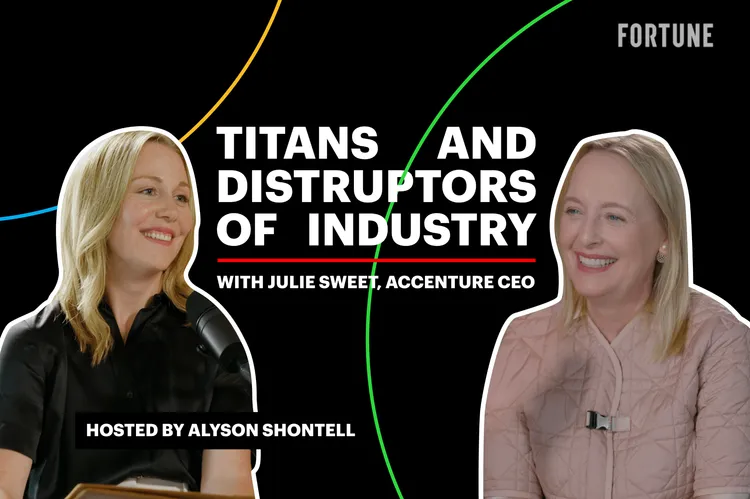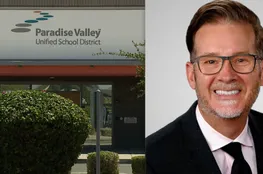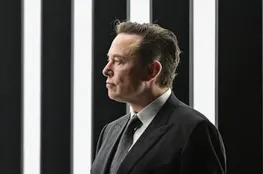Julie Sweet is one of the most powerful executives in the world, overseeing a 770,000-person workforce at consulting giant Accenture. In her role, she speaks to more Fortune 500 CEOs than almost anyone—dozens of companies pay Accenture $100 million-plus in a single quarter to help them solve their biggest problems—so she has her finger on the pulse of the biggest issues in business today. I sat down with Sweet for the launch of a new vodcast I’m hosting, Fortune 500: Titans and Disrupter’s of Industry (watch the full episode here, and subscribe on YouTube or Spotify). You can think of it as CEO Office Hours: If you get to spend a full hour with the most experienced business leaders on the planet, what wisdom can you extract?
Here’s some of what we discussed in our hour-long sit down:On AI:How she uses AI in her personal life and in her CEO job.How long it will really take AI projects to pay off for businesses. (A recent market-moving MIT report suggested 95% of generative AI pilot projects are failing.)How companies should think about AI implementation, and whether or not agentic AI is worth the investment.Predictions on when we will get to Artificial General Intelligence (AGI) and what it will mean for the future of work.
On management and leadership:How to weigh a mid-life career change. Sweet was a high-powered lawyer at a top firm but left that career path in her 40s to join Accenture.How she got offered the top job—and how not to react if it feels like a stretch role.How she leads massive restructurings and gets her workforce on board—without written memos.Why one of her superpowers is asking for help, and a critical career lesson her dad taught her about being over-prepared.
On work, life and health:How she has battled cancer twice, and what each diagnosis has taught her about her priorities and long term goals.Listen to the vodcast or read the transcript, which has been lightly edited for length and clarity, below.3 big global trends CEOs are thinking about today: AI, a global geopolitical shift, and tariffsI’d just love to start with an economic snapshot from your vantage point. What are the major things on your radar that are affecting your business, but also of the businesses of all the CEOs that seek your counsel and work with Accenture?The obvious one has been tariffs and trade, and that affects countries differently. But there isn’t a country that’s not being touched by that. Second, there has been an ongoing shift in geopolitics. You’ve been seeing a shift in geopolitics for some time, like the role of the Middle East. We look at Southeast Asia as things have changed with China, and so making sure that you understand the opportunities and the challenges. So oftentimes people think about the supply chain, but it’s also a huge opportunity, and are you positioned to take advantage of where growth may come in the future?How Fortune 500 companies can survive an AI future without getting disrupted and replacedThere was something that I saw recently, an interview with venture capitalist Vinod Khosla. He has bold predictions. One of his bold predictions is that in the 030s, we will see the biggest demise of Fortune 500 companies that we’ve ever seen. It’s probably your job to make sure that doesn’t happen. But do you think that could be possible given the rate of change we’re seeing now with AI?I always bet on companies and CEOs but I’m working around the world so I can tell you with absolute conviction that CEOs today are focused on making AI the biggest growth opportunity and not the thing that causes their demise. It’s really different than prior technology waves in the speed at which CEOs and boards have recognized the importance.When you go back and think about the move to the cloud, it took several years to convince people that this made sense, and now it’s totally different with AI, it’s happening much faster. When you see that kind of conviction universally across industries, I would predict that that prediction is not going to be the outcome. Because companies, when they do embrace the technology as opposed to fight it, it should amplify growth.There are going to be challenges. There are certainly going to be challenges on like skills that go away. There’s a lot to manage, but it’s hard to explain just just how different it is. Since I’ve now lived through the whole digital transformation, the mindset at the top is very different, and that’s why I have a lot of confidence that we will figure this out to be a net positive.But do you think it needs to be a drastic overhaul of organizations, of processes, of everything for that survival to happen? What do you think needs to happen for these Fortune 500 just stay on top. One word, reinvention. You know, I first introduced this concept…
Reinvention, like top to bottom? Rip it all out?The entire enterprise. We first said it in 2022 and at the time people were like, this is just a consulting thing. Right – wasn’t AI supposed to kill you guys [in consulting?]Exactly. And in 2022 I said, “This is going to be the decade where people have to reinvent using tech, data, and AI,” and now that language is not just being used by Accenture. Our clients are using it on their own.So what it takes is reinvention, and that is where I spend a lot of time making sure that companies understand what that means. This isn’t about using AI on top of what you do today. If you’re not significantly changing the way you operate, then you’re not reinventing, and you’re not going to capture the value.What I’m seeing is in every industry, there are leaders who are absolutely embracing reinvention. Whether it’s in manufacturing, where people are starting to use digital twins, or in core banking. You’re seeing it in every industry, and that is what it takes. It’s happening so much faster than the last big technology evolution, which was digital.Julie’s boldest future prediction: AGI is coming, and coming soon.For final question: As a CEO, it’s your job to try as best you can to see around the corner. What’s your boldest prediction for where AI will take the workforce and the future of work in the next decade?I do think in the next decade, we will get to AGI. I don’t know what that’s going to look like for intelligence. Super intelligent AI is smarter than us humans, yes. So if you go out a decade, I think we’re going to have a new level of AI, and I don’t think we know today how that will actually affect the workforce. What I do know is that the level of discussion among corporations and governments—nobody’s putting their head in the sand. They’re saying this is a super powerful technology. It’s going to get even more powerful.I’m very confident, because I’m in these conversations all the time that companies and countries are focused on making sure that we’re thinking through, what will the implications are be? What are the guardrails? How do we make sure that when super intelligence comes, it isn’t like another Dark Web moment and that instead, we’re controlling it.This story was originally featured on Fortune.com.
























